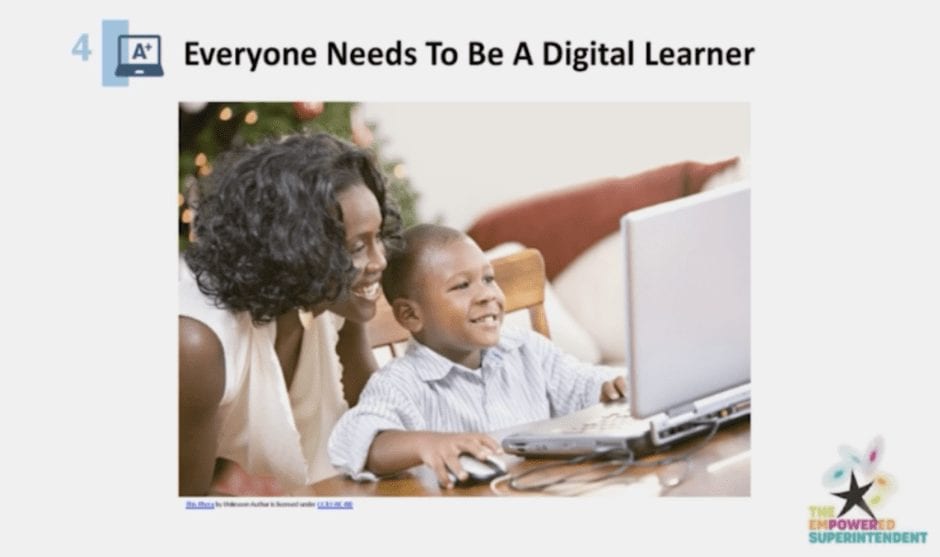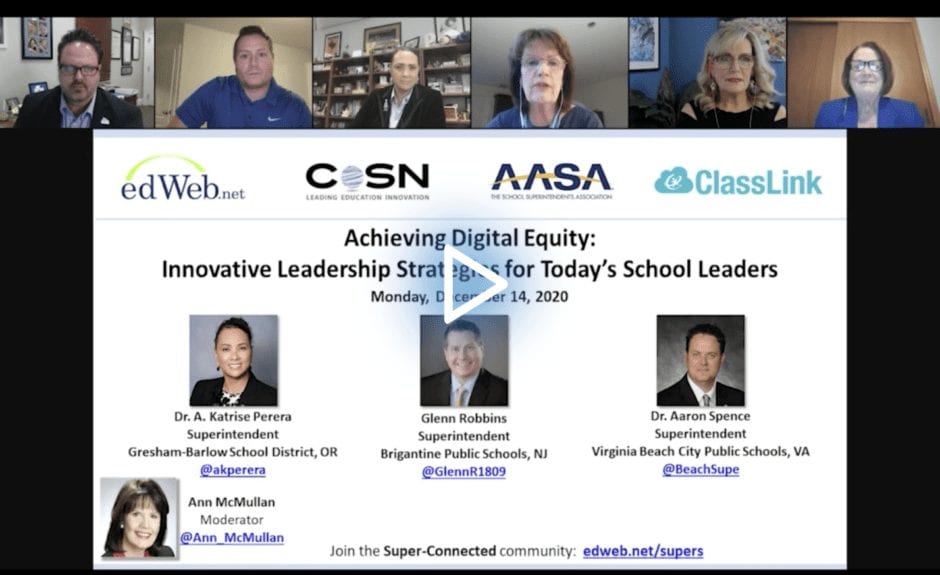Digital Equity After the Pandemic
By Stacey Pusey
With the pandemic has come a reckoning on how big the digital equity gap is in the United States. During an edWebinar sponsored by ClassLink and co-hosted by CoSN and AASA, three superintendents discussed their observations about digital equity and what their districts need to do next.
- All conversations start with why: Get all constituents involved from the beginning—even students and teachers—as to how the schools might adopt digital learning. Get them all to agree to the why before moving on to the what.
- Familiarity does not equal experience or understanding: Just because staff have some knowledge about technology does not mean they understand how to scale it for effective digital learning. Embedded professional development is needed at all levels to take advantage of the benefits of tech for all students.
- Smartphones don’t equal home access: Students may have a phone, but that doesn’t mean they have home WiFi, unlimited data, or live in an area with a strong signal. Administrators need to have a detailed home survey for every student to understand how to serve them.
- Teachers have access issues too: Not all teachers have high-speed internet or unlimited data either. Schools may need to adjust expectations for them just as they should for their students.
- Skeptics don’t need words—they need proof: In every community, there will be parents, grandparents, teachers, etc., who don’t think digital has value. The best way to convince them of the value is to demonstrate how it’s working to improve student outcomes. Once you show them what it can look like, they get excited and can even be some of your biggest supporters.

- Everyone needs to be a digital learner in the home: It’s not just the students who need to understand how to use the technology—parents, grandparents, babysitters, siblings, etc. could be helping the students and need to have that knowledge as well.
- Monitor what’s being used, how often, and the results: Figure out which platforms best support your families and staff and track when they’re using the program. Adjust access and support accordingly.
- Ask for help: Talk to other school leaders about their challenges and how they approached them. While the exact details may differ, they’re experiencing many of the same obstacles—no one needs to do this alone.
Most important, administrators should remember that even among all of these discussions about technology, it’s the people that matter. Being able to work with and lead the people in the school community is what will help you lead the transformation with digital equity.
This edWeb broadcast was sponsored by ClassLink and co-hosted by CoSN and AASA.
This article was modified and published by eSchool News.
About the Presenters
Dr. A. Katrise Perera proudly serves as the superintendent in Gresham-Barlow School District, in Oregon. She was a successful education leader in Virginia, and Texas before McGraw-Hill recruited her to lead their Urban Markets 2015-2017. She attracted national recognition for the superintendent work she led in Isle of Wight County Schools in Smithfield, Virginia from 2011-2015. She went on to be named the Superintendent of the Year by the National Association of School Superintendents (NASS). Her work evolved from 2000-2011 as an area superintendent-school improvement officer in Houston Independent School District, administrator, principal, and as a teacher in Henrico County Public Schools in Virginia. Dr. Perera has been a strong advocate for equity, student voice, eLearning, culturally responsive teaching, and women in leadership. She is an active member of professional organizations, a frequent presenter, and has composed a number of articles and leadership book excerpts.
Glenn Robbins is Superintendent of Brigantine Public Schools in New Jersey. His passion is harnessing a school culture that thrives on design-thinking skills, innovative digital spaces, high-caliber professional development, exponential thinking, BYOD/1to1, social emotional learning Zen Dens, and makerspaces. Glenn encourages all students to have a voice, not only in building a school culture, but also in designing student-led courses. Glenn has been recognized by numerous organizations for his innovative technology implementation methods and has been a featured speaker at numerous events across the globe. Glenn is a New Jersey representative for the AASA National Governing Board, CoSN Empowered Superintendent Panel, NASSP National Digital Principal of the Year, and co-chair for New Jersey’s NJASA Technology Committee. By empowering students and staff to have a growth mindset through design thinking, while implementing digital tools, we better prepare them for the profound shifts that they will encounter in life.
A passionate and visionary leader in public education for 26 years, Dr. Aaron Spence is committed to ensuring that all students have access to the rigorous coursework, innovative learning opportunities, and resources they need to prepare them for success in college or the workforce. Dr. Spence has served as Superintendent of Virginia Beach City Public Schools (VBCPS) since June 2014. As superintendent, he is responsible for the instructional leadership and administrative operation of 86 schools and centers serving more than 67,000 students. The more than 10,000 employees of Virginia Beach schools credit Dr. Spence with creating and fostering a culture where input is welcomed, opinions are valued, and differences are celebrated.
About the Host
Ann McMullan is Project Director for CoSN’s Empowered Superintendents Initiative. Ann served as Executive Director, Educational Technology in the Klein Independent School District, near Houston, Texas until September 2013, when she and her family moved to Los Angeles, California. For 16 years Ann led the district team that provided professional development on technology and 21st century instructional strategies to 4,000 professional educators serving 50,000 students. Ann served as co-chair of Texas Education Technology Advisory Committee which developed the Texas Long Range Plan for Technology, 2006-2020. Today, Ann is based in Los Angeles working as a public speaker, writer, and education consultant focused on leadership and planning to meet the needs of today’s students. Ann serves on the Project Tomorrow advisory council and is a leadership consultant with Executive Service Corps of Southern California, serving non-profit associations. Ann co-authored Life Lessons in Leadership, a guide for leaders ages eight to 88.
Join the Community
Super-Connected is a free professional learning community on edWeb.net for school superintendents, district leadership, and aspiring district leaders.
 AASA is the premier association for school system leaders and serves as the national voice for public education and district leadership on Capitol Hill.
AASA is the premier association for school system leaders and serves as the national voice for public education and district leadership on Capitol Hill.
 CoSN (the Consortium for School Networking) is the premier professional association for school system technology leaders. CoSN provides thought leadership resources, community, best practices and advocacy tools to help leaders succeed in the digital transformation. CoSN represents over 13 million students in school districts nationwide and continues to grow as a powerful and influential voice in K-12 education.
CoSN (the Consortium for School Networking) is the premier professional association for school system technology leaders. CoSN provides thought leadership resources, community, best practices and advocacy tools to help leaders succeed in the digital transformation. CoSN represents over 13 million students in school districts nationwide and continues to grow as a powerful and influential voice in K-12 education.
 ClassLink empowers your students and teachers with instant access to their learning resources. ClassLink® OneClick® includes a library of over 5,000 single sign-on apps and instant links to file folders at school and on Google, Office 365, and Dropbox cloud drives. ClassLink Roster Server easily and securely delivers class rosters to any publisher using open technology standards. ClassLink Analytics gives decision makers the usage data they need. Accessible from any computer, tablet or smartphone, ClassLink is ideal for 1to1 and Bring Your Own Device (BYOD) initiatives.
ClassLink empowers your students and teachers with instant access to their learning resources. ClassLink® OneClick® includes a library of over 5,000 single sign-on apps and instant links to file folders at school and on Google, Office 365, and Dropbox cloud drives. ClassLink Roster Server easily and securely delivers class rosters to any publisher using open technology standards. ClassLink Analytics gives decision makers the usage data they need. Accessible from any computer, tablet or smartphone, ClassLink is ideal for 1to1 and Bring Your Own Device (BYOD) initiatives.
Stacey Pusey is an education communications consultant and writer. She assists education organizations with content strategy and teaches writing at the college level. Stacey has worked in the preK-12 education world for 20 years, spending time on school management and working for education associations including the AAP PreK-12 Learning Group. Stacey is working with edWeb.net as a marketing communications advisor and writer.




Comments are closed.